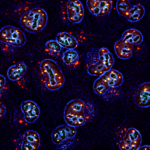Lien vers Pubmed [PMID] – 20951138
Gastroenterology 2011 Jan;140(1):286-96
BACKGROUND & AIMS: Small ubiquitin-like modifiers (SUMOs) are attached to other proteins to regulate their function (sumoylation). We investigated the role of Ubc9, which covalently attaches SUMOs to proteins, in the gastrointestinal tract of adult mice.
METHODS: We investigated the effects of decreased sumoylation in adult mammals by generating mice with an inducible knockout (by injection of 4-hydroxytamoxifen) of the E2 enzyme Ubc9 (Ubc9fl/-/ROSA26-CreERT2 mice). We analyzed the phenotypes using a range of histologic techniques.
RESULTS: Loss of Ubc9 from adult mice primarily affected the small intestine. Ubc9fl/-/ROSA26-CreERT2 mice died within 6 days of 4-hydroxytamoxifen injection, losing 20% or less of their body weight and developing severe diarrhea on the second day after injection. Surprisingly, other epithelial tissues appeared to be unaffected at that stage. Decreased sumoylation led to the depletion of the intestinal proliferative compartment and to the rapid disappearance of stem cells. Sumoylation was required to separate the proliferative and differentiated compartments from the crypt and control differentiation and function of the secretory lineage. Sumoylation was required for nucleus positioning and polarized organization of actin in the enterocytes. Loss of sumoylation caused detachment of the enterocytes from the basal lamina, as observed in tissue fragility diseases. We identified the intermediate filament keratin 8 as a SUMO substrate in epithelial cells.
CONCLUSIONS: Sumoylation maintains intestinal stem cells and the architecture, mechanical stability, and function of the intestinal epithelium of mice.


